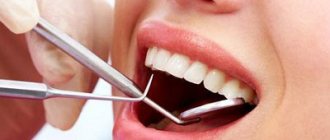How to relieve wisdom tooth pain during pregnancy: removal or painkillers?
Quite often during pregnancy, wisdom teeth hurt.
What to do in this case and should it be removed? Is resection the only possible solution to the problem? This information will help expectant mothers make safe and effective decisions in case of problems with the so-called “eights” (teeth numbering).
Doctors recommend that before a planned pregnancy you should definitely consult a dentist for a consultation. He will examine your oral cavity and tell you what measures you need to take to avoid dental problems.
Why does pain occur if third molars come in? The problem is based on fundamental changes that occur in the mother’s body, this is due to hormonal balance, due to disruptions in which hair, nails and teeth grow rapidly. The growth of wisdom teeth can take several years, but when a woman becomes pregnant, it noticeably accelerates, which leads to pain.
The development of the tooth leads to injury to the gums, followed by inflammation due to the entry of harmful microorganisms into the damaged area. Irritation of sore gums with pieces of food can also increase pain and provoke inflammation.
The symptoms and process of tooth growth are approximately the same for all people, but given the condition of the woman during pregnancy, it becomes much more difficult to alleviate the signs of teething and take other measures to treat both the tooth itself and the gums.
For each person, the symptoms of wisdom teeth erupting may be different, as well as the degree of pain of this process. It all depends on how a particular tooth is cut and whether there are any pathologies. However, there are a number of signs that are characteristic of all people, these include:
- swelling of gum tissue, inflammation;
- increased body temperature and diseased area;
- constant aching pain, intensifying after irritation of the gums;
- bad breath caused by the processes of suppuration at the site of eruption;
- with severe edema, swallowing becomes difficult;
- lymph nodes enlarge.
Why do wisdom teeth hurt?
Let me clarify - why do they often hurt in pregnant women? Pregnancy is a very difficult period for health. At this time, a large percentage of minerals goes not to your own body, but to the unborn child. Including calcium, vitamin D, phosphorus and other substances that are responsible for the strength of tooth enamel. Therefore, teeth are destroyed faster, including third molars.
As these teeth grow, pericoronitis, an inflammation of the gum tissue, also often begins. With constant relapses of this disease, it is recommended to remove such teeth.
Pericoronitis
Typically, these teeth are located in places that are very difficult to clean properly. This leads to the appearance of caries. Often the figure eight, which has not yet fully erupted, begins to collapse under the influence of bacteria. What to do in this case? Some people believe that it is best to remove the tooth immediately, others are committed to the idea of saving the tooth to the last.
During the process of teething, the gums become very inflamed. Sometimes it even begins to fester. The doctor is forced to prescribe an antibiotic to stop this dangerous process. Otherwise, a cyst may form. But not all drugs of this type are safe during pregnancy.
Pericoronitis - treatment
Is it possible to have a tooth removed during pregnancy?
Tooth extraction during pregnancy is a dangerous process, but often simply necessary. If a tooth grows very slowly, causes pain and can cause suppuration, then its resection is an effective measure to protect the health of the mother and child.
The dentist decides to remove a tooth if:
- there are injuries or other damage to the tooth and periodontal tissues;
- inflammation of nerves and gums;
- the patient experiences acute, constant pain;
- A benign tumor (cyst) forms on the tooth.
► Depending on each specific case, the dentist decides when to schedule tooth extraction: before or after childbirth.
The doctor will pay special attention to painkillers; as a rule, the operation is performed under local anesthesia. High-quality drugs do not harm the health of the woman or the baby, but the period during which the removal is carried out is of great importance.
It is recommended to perform the operation in the second trimester. At the first and third stages, there is a threat to the normal development of the fetus and the health of the mother, but if the problem does not tolerate any delay, then the doctor can carry out the procedure at these stages.
Until the 13-14th week of pregnancy, the most active formation of the fetus occurs, so it is not recommended to take any medications and deteriorate the moral and psychological state of the mother, which necessarily occurs during tooth extraction.
In the third trimester, removing “eights” is not recommended due to the high risk of premature pregnancy, which can be caused by stress from medical intervention.
Video: can third molars be treated during pregnancy?
What to do if your wisdom tooth bothers you while expecting a baby?
If wisdom teeth provoke various problems, for example, severe inflammation of the gums, unbearable pain, or interfere with neighboring teeth, then the dentist decides to remove the “eights”.
However, during fetal ripening, without consequences, such a procedure can only take place in the period from 13 to 32 weeks or after delivery. In the early stages and last month of intrauterine maturation of the fetus, it is extremely dangerous to remove any teeth, including wisdom teeth.
Removal of wisdom teeth in expectant mothers
If the danger and discomfort from cutting wisdom teeth does not exceed the risk from surgery, then you should wait until childbirth and then begin treatment methods.
Features of resection of third molars in expectant mothers:
- correct choice of time for the operation - the most appropriate period is considered to be from 14 to 34 weeks (second trimester), at this stage the mother’s body is already quite strong, and the key processes of fetal formation have passed. If the pain begins to cause discomfort in the third trimester, the doctor will most likely recommend being patient and waiting for childbirth;
- safe diagnosis - pregnant women are not recommended to have x-rays, but when an image is absolutely necessary, a radiovisiograph is used (it produces much less radiation);
- correct selection of painkillers and type of anesthesia - local anesthesia is used (general anesthesia is strictly contraindicated), but with drugs and their choice, things are somewhat more complicated. On the one hand, it must have a strong analgesic effect, on the other hand, it must be safe for the mother and fetus. It is recommended to use products without adrenaline (for example, ultracain-D);
- caring for a tooth socket after extraction can become more dangerous for the mother and baby than the operation itself, as complications may appear: swelling, pain, high body temperature, bleeding and even pus (the most dangerous sign). To avoid complications, you should properly care for the problem area and regularly consult your dentist; after surgery, he will recommend a number of procedures for caring for the socket based on your situation.
Read also: You can have teeth removed during pregnancy
Removal of a wisdom tooth during pregnancy is allowed, but only in case of emergency, since the resection procedure is associated with a risk to the health of the mother and fetus, and requires a high level of qualifications from a specialist.
What should pregnant women not do during inflammation?
- Applying tablets locally to the gums to reduce pain leads to irritation of the mucous membrane and the appearance of ulcers.
- Applying heat (for example, a heating pad) or rinsing the mouth with warm infusions leads to the spread of infection.
- Make your own diagnosis and prescribe medications.
How to relieve aching pain?
Pregnancy limits a woman's use of painkillers. Traditional medicine recipes will help reduce discomfort:
- clove sticks or cotton swabs with clove oil are placed on the gums for 10-15 minutes;
- If your cheek is swollen, regular ice will help. Ice cubes should be packed in a bag, wrapped in soft cloth and applied to the sore spot;
- chopped garlic and its juice are left at the site of wisdom tooth growth for 5 minutes;
- A “sleeped” warm tea bag is placed on the inflamed area to reduce discomfort.
How to speed up the eruption of wisdom teeth?
The growth of the “eight” does not occur in one week, but stretches over several months or years. This is due to the work of certain hormones. If there is no inflammation or swelling, you can speed up the growth of your wisdom tooth. To do this, massage the gums in a circular motion or bite and chew a piece of meat or lard.
It is not uncommon for “pockets” to appear when a tooth has partially erupted. Food particles remain in the cavity, bacteria and infections accumulate. In this situation, the help of a surgeon will be needed to prevent suppuration (excision of the mucous membrane is performed).
Is it possible to have a wisdom tooth removed during pregnancy?
Indications for surgical intervention are:
- acute pain;
- inflammation of the gums and trigeminal nerve;
- presence of injuries;
- cyst formation.
The dentist, after examining and assessing the situation, decides whether to remove the tooth immediately or postpone the operation until the postpartum period. The procedure is carried out under local anesthesia. Modern painkillers do not harm the health of the woman and baby, but to reduce risks, removal is performed in the 2nd trimester of pregnancy.
To avoid such problems during pregnancy, you should take care of your dental health at the stage of planning a child.
Based on materials from esli-bolit-zub.ru
Wisdom tooth hurts: how to relieve pain without removing it?
It is often recommended to cope with toothache without surgery, but this does not mean that drug treatment is completely safe for the expectant mother, however, it will help reduce discomfort.
First, let’s list point by point how you absolutely cannot relieve tooth pain during pregnancy:
- It is strictly forbidden to take popular painkillers such as Aspirin, Analgin, Ketanov, they really relieve pain, but their composition will harm the health of both mother and baby.
- Do not use heating pads, warm compresses or solutions, as this may spread the infection from the affected area throughout the mouth and body.
- Do not place painkillers on a problematic tooth or gum, as this will lead to irritation and ulcers of the oral mucosa.
- Do not make any independent decisions to determine the diagnosis, the condition of the oral cavity, or the choice of treatment and medications; this is solely the task of the dentist.
To replace the action of Aspirin or Analgin, it is recommended to use gentle analogues.
► You can make special lotions with Ultracaine:
- take a small piece of cotton wool;
- moisten it with the solution;
- apply to the gum in the place where you feel the most severe pain;
- Be careful not to swallow the drug with saliva;
- Keep the lotion for no more than 15 minutes, after which it is recommended to get some sleep.
Traditional medicine also offers a number of alternative painkillers that do not harm the body of the mother and baby. Their effectiveness will be lower than that of pharmaceutical drugs, but they are much safer. The following recipes soothe irritated gums and relieve pain:
- Use ice to reduce gum swelling. Apply it to the gum several times for 5 minutes;
- soak cotton swabs in clove oil and place on the affected area of the gum. This will help reduce local temperature and irritation;
- for the same purpose, place a used tea bag on the gum;
Accelerating the eruption of wisdom teeth during pregnancy is another way to relieve pain. This is done by massaging the gums on the problem area or chewing viscous and elastic food (meat).
If there are “pockets” on your gums, then contact your dentist, who will use small incisions to get rid of them. After the procedure, carefully monitor the condition of the mucous membranes of the oral cavity, try to prevent the occurrence of inflammatory processes.
Video: Dr. Komarovsky about whether it is possible to treat wisdom teeth during pregnancy
What if I delete it?
If doctors decide to remove a damaged tooth, this can be done between the 13th and 32nd weeks. Earlier or later the procedure is contraindicated. As for the choice of anesthesia, there are many drugs that do not penetrate the placenta. The most commonly used are Primacaine and Ultracaine.
Primacaine
However, the correct dosage is extremely important, which depends on several factors - the general condition of the expectant mother, her age, and gestational age.
Table. Features of brushing teeth after wisdom tooth extraction - step-by-step instructions.
| Steps, photo | Description of actions |
| Step one | The piece of bandage/gauze that the dentist placed in place of the removed wisdom tooth should be changed at the recommended frequency. Usually you need to change it about an hour after removal. If bleeding continues, you need to change it approximately every half hour. |
| Step two | You should not brush your teeth for 24 hours after extraction. The same goes for using mouthwash and floss. Otherwise, a blood clot may fall out, and in the worst case, the stitches will break. |
| Step three | You should also try not to brush for three days in the place where the tooth was removed. Here, for now, you can only rinse with a simple solution (a pinch of salt in 0.5 cups of warm water). |
| Step four | In the future, teeth should be brushed carefully and slowly. The brush should have soft bristles. |
| Step five | Floss and brush can be used three days after extraction. But you need to be extremely careful with the hole! Also, don’t forget to brush your tongue. |
| Step six | To avoid the development of infection, the oral cavity must be kept clean. Contact your doctor immediately if you notice any of the following symptoms: fever, difficulty breathing/swallowing, pus near the socket! |
Video - Is it possible to remove a wisdom tooth during pregnancy?
Eruption of wisdom teeth during pregnancy
Eights are teeth that appear when the entire jaw is already formed. Since they do not have enough space, when wisdom teeth erupt, many complications occur - injury to the jaw, displacement of adjacent incisors, etc.
A pregnant woman is the first to be at risk, since this period is characterized by weakened immunity and hormonal imbalances, which provoke dental problems.
Equally important is the lack of calcium, which is simply necessary for a pregnant woman for normal growth and development of the fetus. Inflammatory processes with improper eruption have serious consequences that can harm not only the expectant mother, but also the unborn baby.
Read also: Wisdom teeth hurt during pregnancy
Treatment Options
What to do if your wisdom tooth hurts during pregnancy? Treat, pull out or take some pills?
Wisdom tooth hurts during pregnancy - what to do
So, option one - go to the doctor. The first thing you should do is tell him that you are pregnant. This is especially important in the first months. Remember - the doctor does not have psychic abilities. If you don't have a noticeable belly, he won't know that you already have a new life inside you. Therefore, as soon as you come and talk about symptoms, immediately clarify that you are in such and such a month. Based on this, the specialist will decide how to help you. After all, many drugs are dangerous to the fetus.
If the tooth is simply difficult to cut, the dentist’s task is to reduce pain and relieve inflammation from the gums. The first is more difficult, since most effective agents are anesthetics.
Pregnant woman at the dentist
The main thing is to eliminate gum inflammation. After all, if your tooth is healthy, it is this that causes pain. You can rinse with chamomile, baking soda, and Chlorhexidine solution. We need to stop the spread of infection.
Preparations for treating gums during pregnancy:
| Photo | Name | Manufacturer |
| Spray Miramistin | Russia | |
| 0.05% Chlorhexidine solution | Russia | |
| Vinylin | Russia | |
| Hydrogen peroxide | Russia | |
| Spray Tantum Verde | Italy | |
| Levomekol ointment | Ukraine | |
| Sea buckthorn or rosehip oil | Russia |
You should not use different gels with lidocaine. It can harm an unborn baby. This substance is also dangerous when fed. And when your baby gets his first teeth, don’t use gels that contain it.
Chlorhexidine
Video - Is it possible to treat teeth during pregnancy?
Complications
If a wisdom tooth is cut, this process can cause pericoronitis, an inflammatory process in the gums around the incisor. This disease causes a rotten smell from the mouth and severe pain. Pericoronitis is treated with antibiotics, and the affected teeth are treated with a special medical solution. If you do not resort to treatment in time, there is a possibility of developing a jaw cyst.
If your wisdom tooth hurts during pregnancy, you should immediately consult a dentist. Self-medication in this situation is excluded.
Since the body needs a large amount of calcium during pregnancy, the likelihood of rapid development of caries during this period is enormous. This leads to various damage to the enamel and unbearable pain. While pregnant, a disease called periodontal disease may also occur. At the initial stage, it can be cured with rinses, and in more severe cases you should consult a dentist.
Mouth rinse
Does a pregnant woman have a toothache? This may mean the development of an inflammatory process of the trigeminal nerve. The disease occurs due to pressure from blood vessels on nerve endings. This condition can develop due to hormonal changes, nervous stress and stress.
Possible complications when teething during pregnancy also include:
- malocclusion;
- pressure on neighboring teeth and their roots;
- ingrowth of a wisdom tooth into the cheek.
If your teeth hurt during pregnancy, this is a reason to immediately consult a dentist.
What can you do about pain at home?
Pain after wisdom tooth removal during pregnancy occurs due to tissue damage. After this cause has ceased to exist, tissue inflammation has passed, it is necessary to prevent the proliferation of microorganisms that are in the oral cavity. If they get into the hole from which the tooth was removed, this will lead to an inflammatory process and pain. To eliminate this process, antiseptics are used.
Table of antiseptic procedures after surgery.
| Product name | Description, application |
| Furacilin | An antiseptic that is produced in the form of tablets that are dissolved in water. Rinse your mouth with the solution every hour to prevent the proliferation of microorganisms. Eliminates the risk of penetration of bacteria from neighboring formations (teeth, gums, tonsils). |
| Saline solution | Removes fluid from swollen areas. Apply 3-4 times a day. |
| Soda solution | Has an antiseptic effect. Salt and baking soda are often used together for greater effect. |
| Camomile tea | Has a calming effect on affected tissues. Apply after complete healing of the tissue. |
| Dental gels | Used for local anesthesia and inflammation relief. |
| Miramistin | An antiseptic in the form of a liquid that can be sprayed or poured onto the affected area. It is used after rinsing for no more than 7 days, after this time there is a risk of resistance (resistance) of microorganisms. |
| Hydrogen peroxide, chlorkegsidine | Antiseptic agents that are used as local disinfection. It is necessary to prevent them from entering the esophagus, as toxic infection will develop. Add dropwise to the rinse solution. |
If a pregnant woman’s wisdom tooth hurts, analogues of strong painkillers are used. To do this, you can apply lotions with ultracaine. This is a pain reliever that is usually given by injection. They blot the gauze (cotton wool cannot be used, some of it may remain in the affected area) and apply it to the area of the extracted tooth for 20 seconds. The liquid from the medicine should not be swallowed.
Folk remedies are used to relieve postoperative pain. For this, special procedures are performed:
- applying or holding ice in the mouth near the gums for 5-7 minutes;
- after the gums have begun to heal, you can use soothing oils (from cloves, sea buckthorn), which have an anti-inflammatory effect;
- To relieve irritation and reduce the effect of pathogenic microorganisms, apply tea bags.
Oksana Shiyka
Dentist-therapist
Important! Traditional medicine is designed to relieve inflammation, irritation, and swelling. This helps relieve pain. These procedures cannot be carried out immediately after surgery, as it can cause infection. A doctor's permission is required for these manipulations.
If during pregnancy the gums around the erupting wisdom tooth are swollen, but there is no indication for its removal, you can use methods that will help its appearance. To do this, chew solid food or massage the gums.
If there is an inflamed area near the formed wisdom tooth, contact the dentist to cut it and remove excess tissue.
Wisdom tooth removal during pregnancy
Dentists recommend removing wisdom teeth at the stage of planning a child, since this operation is complicated by multiple restrictions and is a serious stress for the expectant mother.
If this moment was missed for some reason, removal of wisdom teeth during pregnancy is quite possible. The indication is inflammatory processes in the gums, which are dangerous to the health of the fetus and mother, as well as damage to the oral mucosa.
It is also necessary to remove teeth during pregnancy if there is a jaw cyst or inflammation of the trigeminal nerve. The dentist, in turn, will determine the complexity of the situation and, possibly, reschedule the operation for the postpartum period.
Gynecologists recommend having wisdom teeth pulled out during pregnancy between the 13th and 32nd weeks. The procedure cannot be carried out in the first 2 months of gestation and in the last term.
Today, the expectant mother can choose painkillers that do not affect the development and health of the fetus, so removing and pulling out teeth with anesthesia during pregnancy will not have dangerous consequences.
The dentist must approach the choice of medication with all responsibility.
Tooth extraction during pregnancy is a responsible procedure, but subsequent rehabilitation requires no less attention. Since a blood clot should appear in the hole after the removal of the incisor, which ensures healing, rinsing in the first days after the operation is prohibited. It is also not recommended to eat too hot or cold food. You should also avoid sour and sweet foods.
Sweets - be careful with them
Remember: it is possible and necessary to pull out a tooth during pregnancy. In any case, this is better than enduring wild pain, thereby causing irreparable harm to your nervous system.
Wisdom tooth!!! Who removed during pregnancy??? For all
Girls, are there anyone among us who underwent this terrible procedure during pregnancy??? When was this? How did you handle it overall, both the injection and the process itself, and what happened after the next day???
I’m so scared, but I’m afraid I won’t be able to wait until the birth (((Back in February, when I just found out that I was expecting a baby, this damn tooth hurt, after taking a picture, it turned out that one of its parts was growing crookedly right into the bone! The doctor said to remove it definitely the sooner the better better... I decided, after giving birth, definitely, that’s when I give birth, I’ll run straight away! I healed the tooth, or rather the gum, with chamomile and soda, everything was fine, but now I’ve been suffering for several weeks now (((my jaw feels like it’s clicking when I eat, it’s so it’s scary, as if it’s about to fall out, and as if the bite has begun to change, it’s somehow uncomfortable to chew on that side, plus these clicking sounds are generally creepy ((
I know that after removal they take antibiotics, but what about pregnancy, and how will this affect the child, I’m already silent about the fact of the procedure, how much nerves and worries it involves, and an injection is also a medicine..
Best posts on this topic:
How to numb a painful tooth before visiting a doctor?
Pain relief from toothache during pregnancy is possible, but you should remember that relieving discomfort is only temporary relief, so you should visit a doctor as soon as possible.
- "Paracetamol". This remedy can be used during pregnancy. You just need to calculate the correct dosage. In this situation, it is better to buy tablets. To relieve pain, take one capsule with plenty of water. The maximum daily dose is 4 g.
- "Panadol". This medicine will also help not only numb the tooth, but also relieve fever, relieve headaches, and body aches.
- "Nurofen". Another remedy that helps when a pregnant woman has a toothache. It should be remembered that tablets are allowed to be used only in the 1st and 2nd trimesters. The drug should be taken before meals. The daily dose of Nurofen is 4 grams.
- "Voltaren." If your teeth hurt during pregnancy, then this remedy will provide timely help. Voltaren can only be taken in the first two trimesters. At the last stage, the active substances can already harm the baby. The maximum daily dose is 150 mg.
- Advil. This remedy can be taken at any stage of pregnancy. It is quite strong and effective. Advil is contraindicated for stomach and duodenal ulcers.
- "Ortofen". This drug should only be prescribed by a doctor. It is taken in any trimester and for unbearable pain in the teeth.
- "Dicloran." Toothache during pregnancy can also be relieved with the help of this drug. Any gastrointestinal disease is a contraindication. The daily dose of Dicloran is 150 g.
- "Naklofen." The product is used only in the 1st and 2nd periods of pregnancy. Niklofen is not recommended for people with gastrointestinal diseases.
Read also: Is it possible to remove a wisdom tooth during menstruation?
How to relieve pain for a while?
There are tips that will help relieve pain for a short time until the pregnant woman receives the necessary treatment from a dentist:
- if it hurts while eating, then try to eat on the side on which it grows;
- Mix sage, chamomile, calendula and St. John's wort thoroughly, pour one tablespoon with a glass of boiling water and leave for about half an hour, strain. Rinse your mouth with this infusion, carry out the procedure every hour until it hurts;
- An old but effective remedy is rinsing your mouth with a soda solution, this will help disinfect the tooth and, accordingly, relieve pain.
If such simple remedies do not help at all, and the pain is simply impossible to relieve, then try to relieve the pain with the help of No-shpa. But remember the main rule - do not exceed the indicated dosage; this is very important during pregnancy.
Home Remedies
If your tooth hurts during pregnancy, you can rinse your mouth with a solution of soda (1 teaspoon per glass of boiled water). This product can be used as much as you like without harming the unborn baby.
Chamomile infusions will also help in this difficult situation. For half a liter of boiling water, take a tablespoon of the product. Let stand for half an hour and filter with gauze. When warm, but not hot, rinse every hour.
Everyone's favorite and familiar garlic has proven itself well. To relieve pain, apply it to the tooth and hold it for several minutes.
What should pregnant women not do for toothache?
- It is not allowed to apply heat or rinse the mouth with hot solutions. This can lead to the spread of pathogenic bacteria. In this case, there is a possibility of osteomyelitis of the jaw.
- Do not apply painkillers to a sore tooth. This will not only not have the desired effect, but will also cause irritation and gum ulcers.
- Do not listen to the advice of friends and acquaintances. Each person is individual, so treatment methods (especially for pregnant women) can only be used after consultation with a qualified doctor.
Remember: painkillers are only temporary relief and not a cure for the problem. Pregnant women who experience pain should consult a doctor. Only he will be able to determine the cause of discomfort in the oral cavity and prescribe the necessary treatment.
Reasons for the frequent appearance of wisdom teeth during pregnancy
There are not so many reasons, but it is still worth remembering why this problem arises in the first place.
- During pregnancy, a woman is just at the age when wisdom teeth begin to cut;
- there is a change in hormonal levels, which can also affect this process;
- Sometimes pain in a wisdom tooth may appear not because it is growing, but because it is damaged, and this happens very often, because a woman’s body during this period needs a large amount of calcium more than ever.
There are tips that will help relieve pain for a short time until the pregnant woman receives the necessary treatment from a dentist:
- if it hurts while eating, then try to eat on the side on which it grows;
- Mix sage, chamomile, calendula and St. John's wort thoroughly, pour one tablespoon with a glass of boiling water and leave for about half an hour, strain. Rinse your mouth with this infusion, carry out the procedure every hour until it hurts;
- An old but effective remedy is rinsing your mouth with a soda solution, this will help disinfect the tooth and, accordingly, relieve pain.
If such simple remedies do not help at all, and the pain is simply impossible to relieve, then try to relieve the pain with the help of No-shpa. But remember the main rule - do not exceed the indicated dosage; this is very important during pregnancy.
When a woman’s wisdom tooth grows during pregnancy, doctors try to do everything to avoid tooth extraction, but sometimes the situation is such that it cannot be avoided. Dentists make this decision only when:
- wisdom teeth affect neighboring ones;
- it is located in such a way that it interferes with the mouth, because of this it hurts, and pain is also felt near the cheek, in other words, the tooth “cuts” the cheek;
- disrupts the bite;
- grows incorrectly;
- It hurts when it compresses the nerve endings.
The big disadvantage is that it can lead to other diseases: neuritis, tissue decay, cysts.
Before the removal process itself, it is necessary to take an x-ray, your dentist should see the full picture of what is happening. Although it is better to avoid medications during pregnancy, including anesthesia, if the pain is unbearable, then its absence can negatively affect the condition of both the woman and her baby. Wisdom teeth must be removed during pregnancy under local anesthesia.
You cannot have surgery during pregnancy whenever you want; the best time is from 13 to 32 weeks.
This is explained simply - this is the period when the mother’s immunity is strengthened and, accordingly, there will be the least danger for the child. Remember, you cannot remove teeth (wisdom or other) in the 1st, 2nd, 9th months of pregnancy.
Medicine does not stand still, so when you go to the dentist, the doctor will probably advise you on medications that will not harm the child, but will help relieve pain.
If you did have to undergo surgery to remove a wisdom tooth during pregnancy, then after that you will have a so-called rehabilitation period.
On the first day after the operation, you should not eat hot food or rinse your mouth with water; try to limit any touching of this place as much as possible, give a little time for the dimple formed in its place to heal. As a result, blood will accumulate in the “dimple” after removal and soon a kind of blood clot will appear in place of the tooth.
The presence of this clot helps speed up the healing of the place from which the incorrectly growing wisdom tooth was removed. If you do not follow the slightest rules and do not listen to the doctor’s advice, then an unpleasant taste will appear in your mouth out of nowhere, and the place where it was removed will hurt. If pain does appear, then consult your doctor, he will recommend a special ointment that will ease the pain.
Rules that must be followed for the first time after wisdom tooth removal:
- give up hot food,
- do not brush teeth adjacent to those with a tightening dimple,
- give up smoking and alcoholic drinks,
- rinse your mouth with special herbal decoctions.
Over time, the “dimple” will be filled with bone tissue and will not create problems for you.
Based on materials from nashizuby.ru
Teething symptoms
Signs of the appearance of eights are different for each individual person. Pain sensations can also be different. Often this process depends on various pathologies. But there is a set of symptoms by which you can easily determine the development of a wise tooth:
- Inflammation and swelling of the gums.
- Increased body temperature.
- Constant bleeding in the gum area.
- When the gums are irritated, the sensation of pain increases.
- Suppuration at the site of eruption produces an unpleasant odor.
- Excessive swelling can cause difficulty swallowing.
- Inflamed lymph nodes.
Sometimes the listed signs appear weakly, imperceptibly, and a person may not notice anything. But there are times when pain paralyzes a normal lifestyle. For pregnant women, this is important and you should immediately visit a dental clinic. The health of mother and child are closely interconnected.
Development of tooth eight during pregnancy
The period of its eruption varies from 18 to 25 years. It is at this time that most women think about procreation. Therefore, a wisdom tooth may turn out to be “a fly in the ointment.”
The main cause of unbearable pain is teething, which is often accompanied by complications. Damage to thick tissues causes inflammation. Doctors call this difficult eruption the term “pericoronitis.” In some cases, this situation may require surgery.
In the absence of pregnancy, the process can proceed calmly and painlessly. Many people will not even notice any discomfort. But even if a woman has a short term, she is not immune from acute pain.
What is the reason for this difference? The fact is that the expectant mother’s body begins to work at an accelerated pace, producing a huge amount of hormones for the development of the fetus. This is what promotes tooth growth at an accelerated rate. Due to its rapid passage through the gums, it may grow unevenly.
As a result, there is pressure on the adjacent tooth. Swollen gums can block the exit, preventing eruption. This combination of circumstances leads to unquenchable pain, which is accompanied by an increase in body temperature.
Another cause of painful appearance can be damage. The wisdom tooth is located in the back of the row, caring for it becomes very difficult. Therefore, caries most often occurs in such a hard-to-reach place, and since treatment becomes difficult in this area, dentists tear it out.
Extreme measures
When a woman’s wisdom tooth grows during pregnancy, doctors try to do everything to avoid tooth extraction, but sometimes the situation is such that it cannot be avoided. Dentists make this decision only when:
- wisdom teeth affect neighboring ones;
- it is located in such a way that it interferes with the mouth, because of this it hurts, and pain is also felt near the cheek, in other words, the tooth “cuts” the cheek;
- disrupts the bite;
- grows incorrectly;
- It hurts when it compresses the nerve endings.









